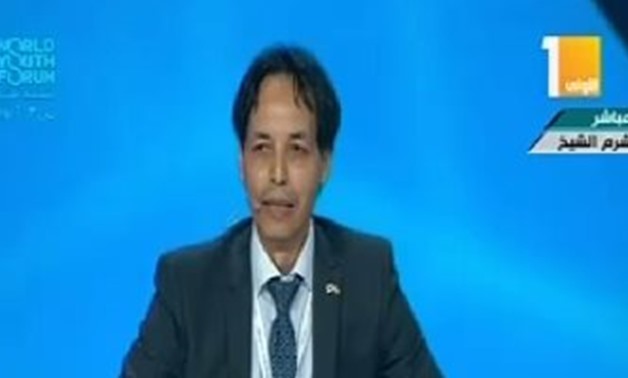
Screenshot of Hussien Zanaty during the session, November 5, 2018.
CAIRO – 6 November 2018: Zanaty Style education is one of the leading education systems in school in Japan, so much so that it was named after its created Hussien Zanaty.
Born to a family in Egypt’s Minya, Zanaty is the father of a teaching style that aims to build the personality of students and ensure they understand the content so well that they are able to teach other students.
Zanaty built a three-phase program.
The first phase is when the student starts to build characteristics for his personality, like responsibility and leadership. The second phase is when groups of students share expertise and capitalise on information; different groups teach each other. The third phase is when students become productive: The student becomes the teacher. The student teaches a person who does not have access to a school or knows nothing at all about the topic, Zanaty explained during the session today.
Zanaty Style was launched in 2015.
Zanaty, who has received an award from the Japanese Government for his work, first tried his educational system in Egypt’s Minya before exporting it to Japan.
During the session, Zanaty thanked President Sisi for strengthening the Egyptian-Japanese relationship.
“I would first like to thank President Sisi for the great strides he made with Japan. It really made a difference for Egyptians living in Japan that he visited in 2016 and that he announced the Japanese programs.”
Speaking of his background, Zanaty said that he is a man from Upper Egypt, Minya specifically, and that he takes after his father; he is the person who has the greatest influence on him. After his father’s death while he was in junior high, his mother and older brother played a big role in his life.
I am an Upper Egyptian man. I was influenced by three people: My dad, mum and older brother. When I moved to Egypt, I learnt that I have to adapt to those around me. I had to change to be able to continue there. I learnt Japanese and was able to get my PhD and also get the Best Researcher Award from my institute, Zanaty explained.
Commenting on Zanaty leaving Egypt, President Sisi said, “ I do not blame you, not at all. It is our duty to focus the media on our pioneering teaching experiences. We are in need of such great initiatives in our society.”
The second annual edition of the WYF will tackle two main axes: peace and development. The forum will bring together 5,000 youths represented by 60 delegations from across the world to explore key issues facing their generation, and determine their role in implementing the global development goals and in facing terrorism.
The first axis will discuss reconstructing post-conflict countries and societies, the role of world leaders in achieving peace, the duty of the international community to provide humanitarian assistance and counter-terrorism, and the Euro-Mediterranean partnership.
The axis of development will include topics related to energy and water security, empowerment of people with disabilities, the role of voluntary work in building societies, the agenda of 2063 African Sustainable Development, digital citizenship, the role of art and cinema in shaping communities, ways to build future leaders, and means of shrinking the gender gap in the work force.
The WYF 2018 agenda
According to the agenda of the World Youth Forum, on Nov. 1 and 2, the forum witnessed pre-workshops related to the "agenda 2063: The Africa We Want" and "Empowering Persons with Disabilities: Towards a More Integrated World."
The opening of the World Youth Theater took place on Friday, November 2. The actual discussion sessions are planned to start on November 4, where participants will discuss a number of issues, including differences among cultures and civilizations, the role of world leaders in building and sustaining peace, the role of soft power in countering ideological extremism and terrorism, and Day Zero: Water security in the wake of climate change.
On November 5, the sessions will tackle the role of entrepreneurs and start-ups in global economic growth, rebuilding societies and states after conflicts, narrowing the gender gap in the labor market and humanitarian assistance: A global responsibility in the face of challenges.
The forum's closing session and the announcement of the World Youth Forum 2018's recommendations will take place on Nov. 6.

Comments
Leave a Comment